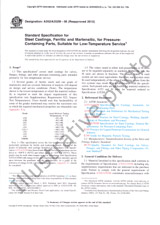We need your consent to use the individual data so that you can see information about your interests, among other things. Click "OK" to give your consent.
ASTM D4971-16
Standard Test Method for Determining In Situ Modulus of Deformation of Rock Using Diametrically Loaded 76-mm (3-in.) Borehole Jack (Withdrawn 2025)
Translate name
STANDARD published on 1.12.2016
The information about the standard:
Designation standards: ASTM D4971-16
Note: WITHDRAWN
Publication date standards: 1.12.2016
SKU: NS-673303
The number of pages: 7
Approximate weight : 21 g (0.05 lbs)
Country: American technical standard
Category: Technical standards ASTM
The category - similar standards:
Earthworks. Excavations. Foundation construction. Underground works
Annotation of standard text ASTM D4971-16 :
Keywords:
anisotropy, borehole drilling, deformation, displacement, Good man jack, jack test, loading tests, modulus of deformation, orientation, pressure testing, rock ,, ICS Number Code 93.020 (Earth works. Excavations. Foundation construction. Underground works)
Additional information
| Significance and Use | ||||||||
|
5.1 Results of this test method are used to predict displacements in rock mass caused by loads from a structure or from underground construction for the load range that the device can apply. It is one of several tests that should be performed. 5.2 Because the jack can apply directed loads, this test method can be performed to provide an estimate of anisotropy. 5.3 In theory, the analysis of test data is straight forward; the modulus estimate requires a record of applied hydraulic pressure versus borehole diameter change, and a knowledge of the rock's Poisson's ratio. In practice, the above procedure, using the original theoretical formula, frequently has resulted in computing a material modulus that was demonstrably too low. 5.4 For analyzing the test data it is assumed that the rock mass is linearly elastic, isotropic, and homogeneous. Within these assumptions, this test method can provide useful data for rock masses for which equivalent continuous properties cannot be found or estimated. Note 1: Notwithstanding the statements on precision and bias
contained in this test method; the precision of this test method is
dependent on the competence of the personnel performing it, and the
suitability of the equipment and facilities used. Agencies that
meet the criteria of Practice D3740 are generally considered capable of
competent and objective testing. Users of this test method are
cautioned that compliance with Practice D3740 does not in itself assure reliable
testing. Reliable testing depends on many factors; Practice
D3740 provides a means of
evaluating some of those factors.
|
||||||||
| 1. Scope | ||||||||
|
1.1 This test method covers the estimation of in situ modulus of a rock mass at various depths and orientations. Information on time-dependent deformation may also be obtained. 1.2 This test method covers testing in an N size drill hole and is more relevant to a borehole jack device designed for “hard rock” than for soft rock. 1.3 All observed and calculated values shall conform to the guidelines for significant digits and rounding established in Practice D6026. 1.3.1 The method used to specify how data are collected, calculated, or recorded in this standard is not directly related to the accuracy to which the data can be applied in design or other uses, or both. How one applies the results obtained using this standard is beyond its scope. 1.4 The values stated in SI units are to be regarded as the standard. The values given in parentheses are mathematical conversions to inch-pound units that are provided for information only and are not considered standard. 1.5 This standard does not purport to address all of the safety concerns, if any, associated with its use. It is the responsibility of the user of this standard to establish appropriate safety and health practices and determine the applicability of regulatory limitations prior to use. |
||||||||
| 2. Referenced Documents | ||||||||
|
We recommend:
Technical standards updating
Do you want to make sure you use only the valid technical standards?
We can offer you a solution which will provide you a monthly overview concerning the updating of standards which you use.
Would you like to know more? Look at this page.




 Cookies
Cookies
